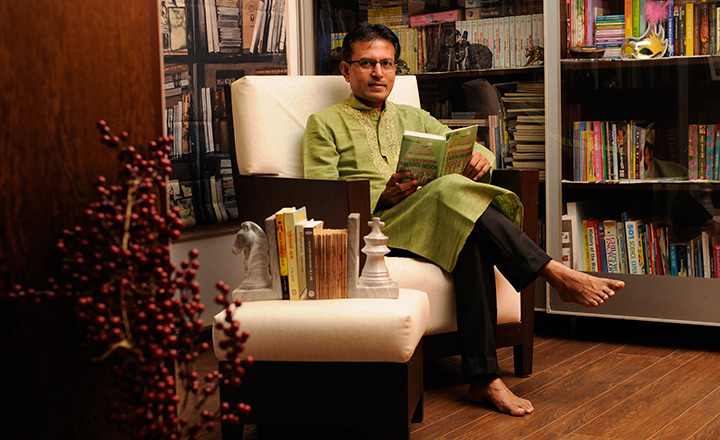It’s very tough for men to accept that they have an ingrained streak of male chauvinism. But then Nilesh Shah has a confession to make. “I always believed I was a good husband. Until I read a Gujarati book titled Sat Pagala Akashma (Seven Steps In The Sky) by Kundanika Kapadia. It was an eye opener for me about the subtle chauvinism prevalent in our society,” says the 48-year-old fund manager-turned-MD of Kotak Asset Management. The book deals with ideas about the liberation of women and the virtual enslavement by husbands. “It talks about how in our culture a woman is bestowed with blessings such as saubhagyawati bhava or akhand saubhagyawati bhava (be blessed, not to die a widow and ensuring a long life for her husband) or putravati bhava (be blessed with a son). Such concepts of marital bliss and motherhood, show a distinct male bias,” feels Shah, who has two daughters. The book has had such an impact on Shah that he gifts the book as a wedding present, whenever possible.
Reading Gujarati literature comes naturally to Shah, who grew up in Kalbadevi, a predominantly Gujarati neighbourhood in central Mumbai. Shah lost his father at a very young age and completed his education in a Gujarati medium school. “Since my mother used to work, and my siblings weren’t really focused on academics, I drowned myself in books that I could possibly lay my hands on — either at my neighbour's place in the chawl or from a nearby library,” recalls Shah.
Shah's favourites have always been books about mythology and those that dealt with medieval Gujarat. "What was taught in school about our mythology and history, was very different from what the Gujarati literature described,” reveals Shah. The fact that Gujarati literature opened up a whole new world for him – beyond what was taught at school, only increased his yearning for reading books. Books written by Kanhaiyalal Maneklal Munshi, the founder of Bharatiya Vidya Bhavan, are among his favourites. “What I learnt about the Mahabharata in school underwent a sea change when I read Munshi’s Krishnavatara [a set of seven volumes],” says Shah. Another Munshi book that Shah relished was titled Jay Somnath. “What was then just a history chapter, which chronicled the invasion by Sultan Mahmud of Ghazni found gravitas in the book. It explained why Ghazni chose to pick on Somanth for his brutal savagery. He wanted to destroy the roots and ethos of Hinduism that ran deep in our country,” explains Shah.
When he got admission in Sydenham College of Commerce & Economics, Mumbai, Shah’s affair with Gujarati literature was cut short after he flunked in his English exam in the very first year. As a topper throughout his school life, he was miserable about flunking. A determined Shah chose to read English literature in his college library. “Since it was all about economics and finance, I had no option but to read English books about these subjects,” recalls Shah. What began as an exercise to improve his English, went on to kindle a spark in the world of finance for Shah, who joined the-then ICICI Ltd right after college. And like they say, the rest is history.
Although he no longer has the time to read Gujarati literature, Shah tries to make up by reading shero-shayaris and poems. “These are short, quick reads — I love reading them. It’s a nice blend of Gujarati and Urdu,” says Shah. Poets like Shunya Palanpuri and Saif Palanpuri are his favourites. There is one poem by Makarand Dave titled Gamtano Kariye Gulal, which Shah finds inspirational and keeps him going at work. The poem states that if one finds something, he or she should not restrict it their own pocket but should try to spread the happiness around. Putting the poem in context Shah says, “Often when I wonder whether I am better off working or better off managing my own money, this poem reminds me that if God has given you a skill set you better use it as an opportunity to enrich others as well. Everytime I read the poem it only encourages me to pursue my job with sincerity and hard work,” says Shah.
The only regret Shah has is that his prized collection of over 150 Gujarati books has now come down to 20-odd copies, since many of his relatives and friends who borrowed the books have failed to return it. Shah says wryly, “Gujaratis just love to borrow.” Though his daughters can read and write Gujarati, they have not retained their father’s passion for Gujarati literature. “They are in a different league and much better in the English language than I am; they can write better than JK Rowling,” chuckles Shah, whose recent addition to the library is a book, which is a collection of shayaris by different Gujarati poets. “I haven’t read it yet but the day I read it, I will use them in my discussions,” says Shah.
The one thing that Shah feels Gujarati literature has taught him, is to be a better human being. “I can’t claim to be a great husband, but I am definitely trying to be a good one,” says Shah with a gentle smile. Looks like, author, Kundanika Kapadia’s effort hasn’t gone in vain.











